Two Retired Ukrainian Artists Choose Croatia Over UK, Make Vir Home
April the 3rd, 2022 - Two retired Ukrainian artists were living their normal lives in the Lviv region of their homeland until the Russian invasion, and in that short period everything changed from them, seeing them relocate from the climes of a grey Ukrainian winter to the mild and sunny Croatian island of Vir.
As Morski/Kazimir Skrbic writes, just several days ago, retired Ukrainian artists Lyudmila and Mikhail Rymik were living their normal lives in the familiar ambience of their home in the immediate vicinity of Stryi, a city of about sixty thousand inhabitants located in western Ukraine in the Lviv region.
It was life as normal until early March when the first smell of gunpowder from eastern Ukraine began to spread further out, reaching more western Ukrainian areas. 68-year-old Mihajlo, a retired builder, gardener and amateur painter, and his wife, Lyudmila, also an artist, made the difficult decision to leave. Mihajlo packed up his van with only some basic hygiene items and his trusty art supplies. They left their two cats and one dog in the care of their diligent neighbours and headed first to Poland, in anticipation of the greatest adventure of their lives.
''When we set off we didn’t really know where we were going. But we wanted to save our pictures and make it to Croatia, where we intended to get in touch with Marica and Mijat Barisic, whom I met in Ukraine three years ago. I only knew that they lived on the island of Vir, but I thought it was good to have someone to go to. Marica's mobile contact from the business card she left me, I called unsuccessfully because I overlooked the fact that you need to put in the area code for Croatia,'' stated Mihajlo. Their long trip through Poland, Slovakia and Hungary took them a full two weeks, and then Mihajlo and Lyudmila, after arriving in the City of Zagreb, managed to establish contact with some friends of Marica and Mijat from Vir.
''Mihajlo's friend asked me if Mihajlo and Lyudmila from Ukraine could come to us. I couldn't immediately remember who they were, because I hadn't actually met Lyudmila, but then I remembered Mihajlo, with whom we hung out when my husband and I were staying in Ukraine. Mihajlo played the guitar in a castle at a gathering organised by our Association of Ukrainian-Croatian Friendship. If you're ever in Croatia, I told him then, stop by Vir,'' said Marica, remembering how one informal invitation had become fateful.
Without thinking, the pair opened their hearts and provided accommodation to the Rymiks, and Mihajlo and Lyudmila have been Vir residents with an address in the Miljkovica settlement for two weeks now. The idyllic landscape of their Ukrainian village has quickly been replaced by being on the deeply desired first row to the sea.
''It's beautiful on the island,'' said Mihajlo, for whom the blue azure of the sea was the current inspiration for the first painting - the Vir motif. The two talented Ukrainian artists arranged the paintings they'd manage to bring with them, as well as their art and painting accessories, all of which can be found on the mezzanine stairs of the family house of their friends.
In addition to the Barisic family, other Vir locals also readily helped out, and their dilapidated and broken-down van, with which they barely reached Vir, was serviced and repaired free of charge by the well-known Vir car mechanic Zivko Vucetic, and now Mihajlo and Lyudmila can drive to Zadar to visit MUP and complete the formalities regarding their current status and stay in Croatia.
In the meantime, the pair of Ukrainian artists have been offering their paintings of larger and smaller dimensions - inspired by Crimea, the Ukrainian countryside, the natural environment, but also the French masters of Impressionism - to Zadar galleries and locals. In order to make some money, Mihajlo is ready, he says, to work doing building again as a master mason, and during the summer season, both of them will try to offer their painting skills to tourists on the beaches.
''I'm willing to do anything to make the situation we're in at least a little bit easier. We're immensely grateful to Marica and Mijat for their hospitality, but we'd like to earn our own money and be independent. I hope we'll be able to make a living from selling our paintings,'' said an optimistic Mihajlo.
Instead of living with family in England, they ended up on Vir
''I suffer with some thyroid problems, so the coastal environment will be pleasant for my slightly impaired health due to the iodine and salt. As we'll definitely stay here on Vir until the end of the summer, we'd like our British family to visit us. We have two daughters who live in England with their families,'' said Lyudmila, explaining why the Ukrainian artists didn't go to England to be with their daughters, sons-in-law and grandchildren, but instead chose to go on an adventure which saw them end up on a Croatian island.
For more, make sure to check out our dedicated lifestyle section.
Speak Startup to Facilitate Croatian Language Learning for Ukraine Refugees
March the 30th, 2022 - The European Speak startup from Portugal is set to help the Ukrainian refugees who have arrived in the country with Croatian language learning.
As Poslovni Dnevnik/Marija Crnjak writes, the European startup Speak, founded in Portugal to support the social inclusion of migrants and refugees, has launched the international platform "SPEAK For Ukraine" for the integration of refugees from Ukraine across Europe.
The platform connects refugees, volunteers and organisations with the aim of integrating Ukrainian refugees as quickly as possible, including offering emotional support groups and the framework for learning local languages, this includes Croatian language learning.
It is a company which, since its founding back in 2014, has created a community of more than 50,000 people across 23 cities, including more than 500 Ukrainians across Europe, and "SPEAK For Ukraine" was launched on March the 12th, a mere 16 days after the war in Ukraine broke out, in cooperation with the Representation of the European Commission in Portugal.
Free and easy access
This platform connects volunteers with organisations and people who need support to break down the language barriers and create an informal help network, and in the first days alone, hundreds of applications were registered through it from more than 60 cities around the world.
The platform can also be used by volunteers and refugees in Croatia, where there are currently about 9,000 displaced people from Ukraine. According to Speak, the platform will allow refugees from Ukraine to have free and easy access to language groups, where they can learn the language of their host country, as well as emotional support groups, to help them and their families integrate into their new communities.
The platform allows volunteers to organise language learning groups, translation and interpretation services from Ukrainian or Russian into many other languages, and helps various organisations to guide refugees.
''Through "SPEAK for Ukraine" we want to complement the work that Speak is already developing with the aim of integrating refugees and migrants on the issue of language barriers in different cities around the world. With this platform, we've created a solution for integration not only at the individual level, but also at the family level. In this way, we guarantee families that they can overcome language barriers and build an informal support network in their host country, by expanding our community to countries where Speak is not yet actively present.
At the same time, we're striving to ensure that organisations across Europe working with refugees at SPEAK For Ukraine find all the language and integration support they need,'' says Hugo Menino Aguiar, the co-founder and CEO of Speak.
A concrete opportunity
In addition to the language barrier, SPEAK For Ukraine also responds to more urgent communication needs, by activating an international network of translators and interpreters, and the needs of psychological support for those who have fled the war in Ukraine.
Sofia Moreira de Sousa, Head of the EC Delegation to Portugal, emphasises that learning the local language, developing personal relationships and creating a support network are key to true integration.
"It simply came to our notice. The European Commission is working relentlessly on several fronts to stop this terrible war, deal with its consequences and protect those seeking refuge in the EU. Cooperation with SPEAK For Ukraine gives us a concrete opportunity to volunteer and an opportunity to support people who are starting from scratch," said Moreira de Sousa.
For more, check out our lifestyle section.
Croats Providing Free Accommodation to Ukraine Refugees Must Pay Tax
March the 28th, 2022 - Remember that old saying about the only two certain things in life being death and taxes? Croatian residents and property owners providing free accommodation to Ukraine refugees escaping war following the Russian invasion of their country must still pay tax despite their good (and free) deed.
As Poslovni Dnevnik writes, Croatian residents who own property and who are receiving Ukraine refugees in their apartments and houses will still have to pay taxes despite making their offer free. The fact is that private landlords in Croatia must sign a lease agreement with Ukrainian refugees who they want to provide a home for in their house or apartment, and tax must be paid on that, even if the rent agreement is signed at zero kuna, the Tax Administration said, Slobodna Dalmacija reports.
According to the Income Tax Act, if the rental amount is reported below the market price - which includes free rent - then the Tax Administration determines the rental price according to the standard rental prices for the place where the property is located. It is a legal mechanism used to avoid an agreed reduction in the rental price between the private landlord and the tenant.
If it weren't set out as such, the two parties could agree to write 10 kuna below the value of the rent on the lease agreement, even though it is actually 200 euros per month, and as such, the landlord would pay less tax (and Lord knows, we can't possibly have that, can we?!).
"These are the rules for now and we can't change that, but it will probably be regulated differently once the announced aid package from the European Union (EU) is approved,'' they explained from the Tax Administration when commenting on this situation which some believe is punishing them for a good deed.
According to the latest data, 9,660 displaced Ukraine refugees have entered the Republic of Croatia so far, most of them being women and children, as Ukrainian men below a certain age typically stay and fight.
Most of these Ukraine refugees are accommodated in private accommodation, ie in apartments provided by Croatian residents. This figure totals 8322 people, ie approximately more than 2000 families. There are 23 of them in reception accommodation, and 1255 in collective accommodation.
For more on the Ukraine crisis and what Croatia is doing to help displaced persons, check out our politics section.
Nobody Exchanging Ukrainian Hryvnia in Croatia, Duty to Fall on HPB?
March the 25th, 2022 - The Ukrainian hryvnia is becoming an extremely tricky currency to deal with in any which way given the current dire events taking place in that country following last month's unjustified Russian invasion. With thousands of Ukrainian refugees now in Croatia, banks and exchange offices have been left scratching their heads.
As Poslovni Dnevnik/Ana Blaskovic writes, around 9,000 Ukrainian refugees who have arrived in Croatia and took some cash with them in a panicked flight before the war have nowhere to officially change it.
In Croatia, the Ukrainian hryvnia isn't being exchanged by banks or by exchange offices, the Croatian National Bank (CNB) confirmed recently. A decision is being made which would see Hrvatska postanska banka take over, but no agreement has been reached yet.
"Regarding the elimination of the problem regarding the purchase of the Ukrainian hryvnia currency, we would like to inform you that the possibility of taking over the purchase of the Ukrainian hryvnia by Hrvatska postanska banka is being considered," said the CNB, which expects a solution soon.
Nobody wants to take the risk
The problem with the purchase of the Ukrainian hryvnia is essentially its non-convertibility, the fear of money changers and bankers that they will have no one to sell it to, at least not without major losses involved. An exchange office which didn't want to be named confirmed that this situation is very real. It does have the Ukrainian hryvnia on its exchange rate list, but it no longer de facto buys it back because the set exchange rate was set deliberately very unfavourably.
"Basically, the Ukrainian hryvnia can be changed, but the exchange rate is set very low, so it doesn't pay off for anyone to do so. The Ukrainian hryvnia is only formally listed because we can't remove it from the list. The bank we work with has completely removed it from its exchange rate list. Nobody wants to risk a pile of banknotes because it isn't known what will happen to that currency,'' said an employee of the exchange office in question.
The issue of the value of the Ukrainian hryvnia is a thorn in the side of not only Croatian banks and exchange offices, but also other European countries to which refugees from Ukraine are arriving. The European Commission (EC) and the European Central Bank (ECB) are both seeking a quick solution to establish a mechanism to enable the conversion of a limited amount at a given exchange rate to limit possible abuse or exploitation of the situation.
On paper it all seems simple, but in practice, the scheme carries great complications as it requires members to guarantee that financial institutions will cover any losses.
According to the FT, members are willing to provide the necessary political guarantees, estimated at one billion to three billion euros, provided the amount is limited to 300 euros per refugee. More than 3.5 million Ukrainians have fled their homeland following Russia's invasion. One of the burning problems they face is the lack of cash to pay for food, clothing, accommodation and other necessities. The Ukrainian hryvnia they took with them can't be exchanged for the euro or other currencies owing to the aforementioned reasons.
In Poland, which has received 2.1 million Ukrainian refugees to date, one Polish zloty could be bought for seven Ukrainian hryvnias before the war, and today 20 hryvnias are demanded for the same amount. Back on February the 23rd, the Ukrainian hryvnia was worth 0.03 euros.
The actual value is unknown...
The reluctance of banks and exchange offices to buy the Ukrainian hryvnia arose because its true value is unknown after Ukraine halted the majority of transactions, froze the official exchange rate at pre-war levels and imposed a moratorium on foreign exchange transactions (except for war-related payments).
The ECB's proposal to the EC provides a European guarantee for the initiation of exchange rate losses to the central bank in which large quantities of Ukrainian currency would end up, at least until the end of the war. In Frankfurt, they concluded that without a guarantee (necessary from the members because it isn't currently provided for in the existing EU budget), they cannot change the Ukrainian hryvnia for euros, since that would be monetary financing which is prohibited by the EU Treaty.
For more, check our lifestyle section.
Croatian Foreign Trade of Goods With Russia and Ukraine
24th March 2022 – An overview of the Croatian foreign trade of goods with Russia and Ukraine in relation to the Russian invasion of Ukraine and the imposed economic sanctions on Russia.
It has been exactly one month since Russia has invaded Ukraine. Nobody knows how much more the war is going to last and we can only hope it will end soon. This is certainly one of the biggest humanitarian crises the European continent has seen in a long time. The West reacted rather promptly to the Russian invasion by imposing severe economic sanctions on the Russian Federation in an effort to persuade Russian leadership to stop the war.
Since the invasion has started, the European Union has adopted four packages of economic sanctions. Even though these sanctions still do not include all parts of the Russian economy, consumers and corporations are often choosing not to do business with Russia and Russian companies on their own initiative. I will provide an overview of the Croatian foreign trade of goods with Russia and Ukraine which will give us a better approximation of the Croatian position in these extreme circumstances.
EXPORTS
In 2021 Croatia exported 204 million Euros of goods to Russia which represents 1.1% of the total Croatian export of goods. In the last few years, Croatian export of goods to Russia has been on the rise, but they are still 28% lower than the level in 2013. In the same period, the relative share of exports to Russia has fallen from 2.9% to 1.1%.
On the other hand, Croatia has exported 58 million Euros worth of goods to Ukraine in 2021 which represents 0.3% of the total Croatian export of goods. In the observed period exports to Ukraine have been rising in absolute terms by 157% beating the total exports growth of 99%. In relative terms exports to Ukraine were fluctuating between 0.1% and 0.4%.
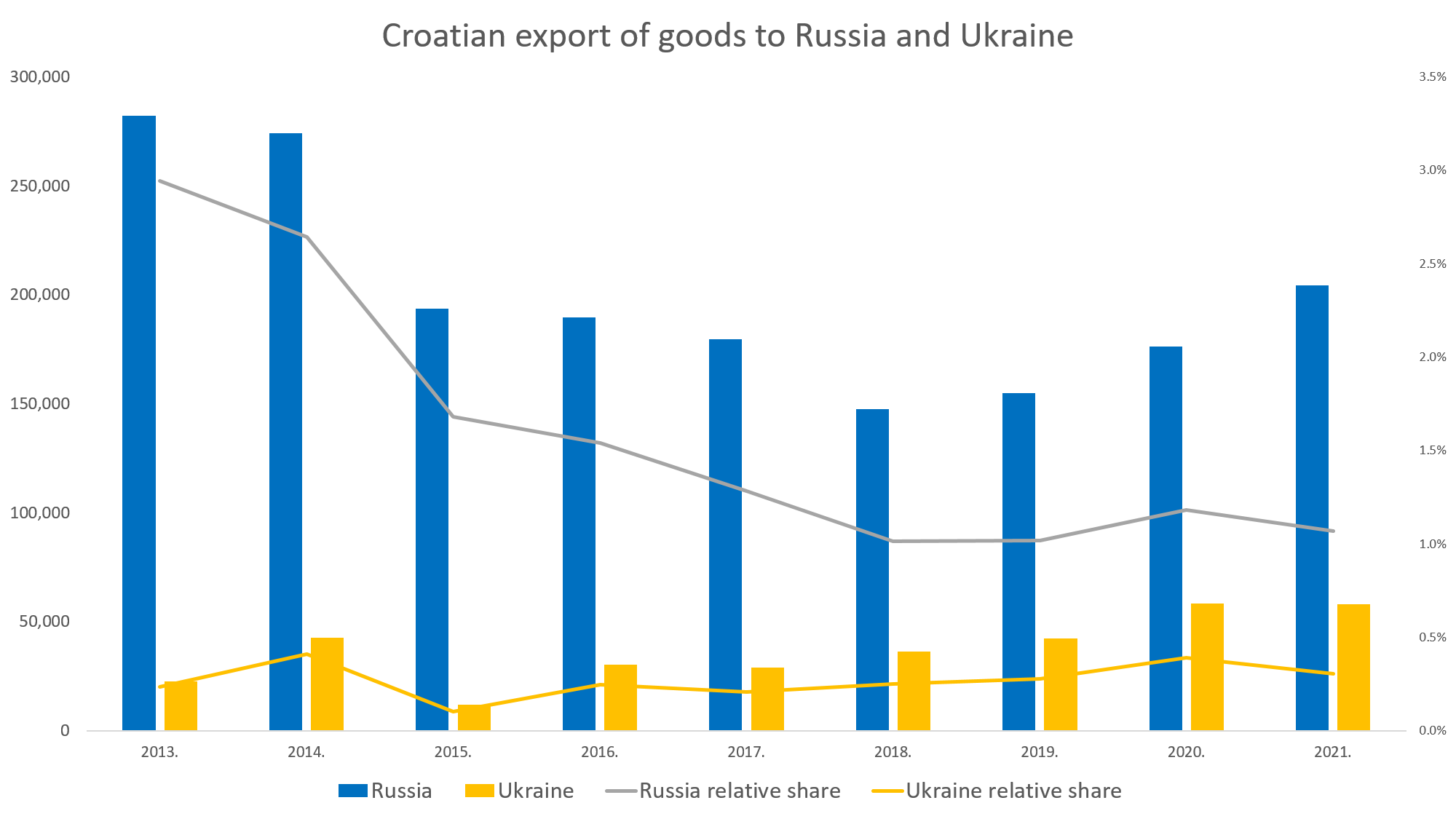
When comparing exports to Russia and Ukraine to other markets we can see that their relative importance in terms of total Croatian exports is very small. The biggest Croatian trade partner is the European Union with 69.2% of exports, followed by CEFTA countries and other countries in America with 16.3% and 3.6% respectively. What is more Russian market does not come even close to the top ten exporting countries and is far behind the Croatian traditional trade partners such as Slovenia with 13%, Italy 12%, Germany 12%, and Hungary and Bosnia and Herzegovina both with 9%.
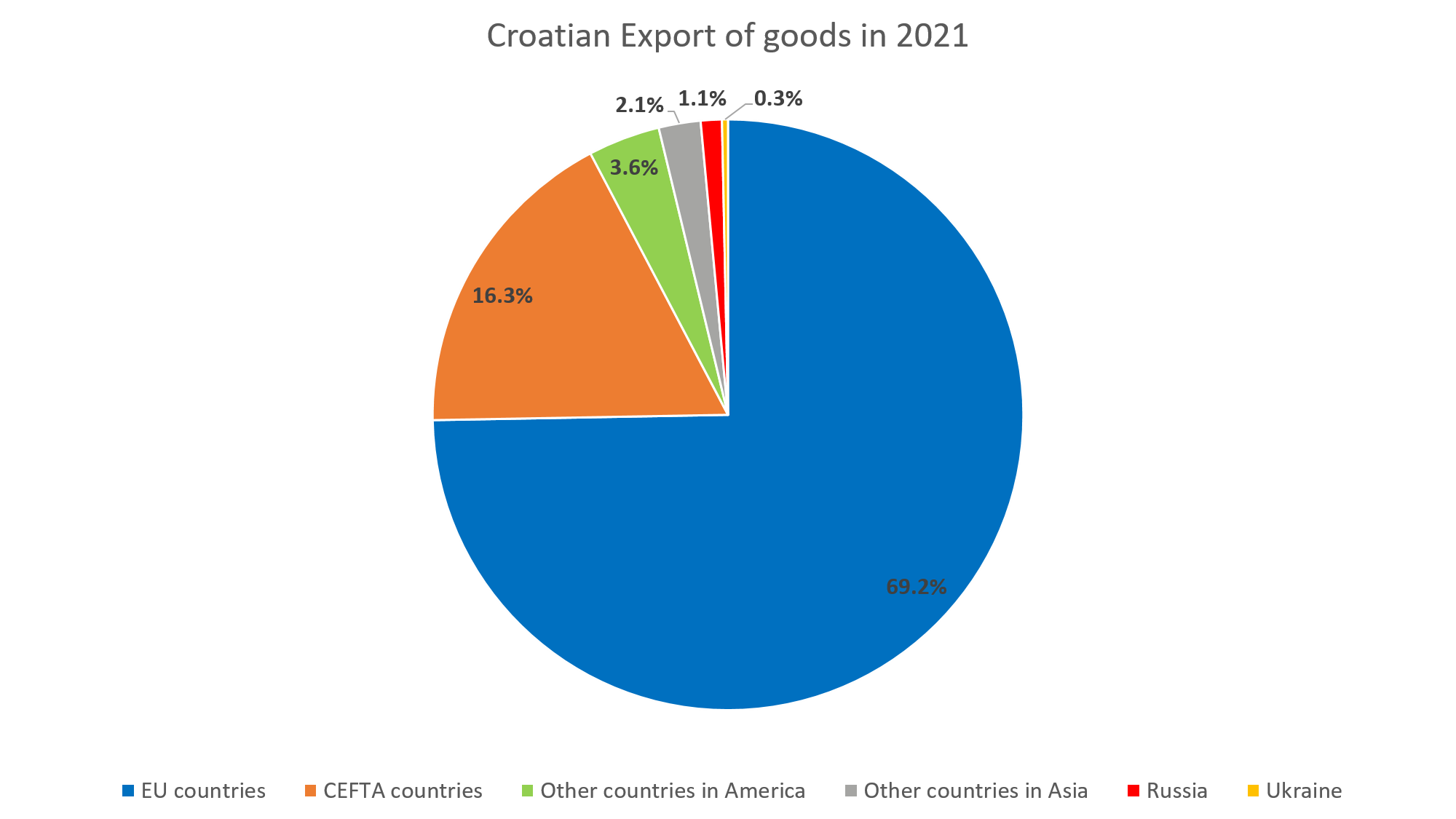
In order to dig deeper into the structure of the Croatian exports of goods to Russia and Ukraine, I have used the official Combined Nomenclature (CN) from the European Union. The breakdown of the exports by the CN is provided by the DZS and the provided data is from 2020. In the case of both Russia and Ukraine, we can see that pharmaceutical products hold the largest share of exports with 39% and 32,2% respectively. The combined export of pharmaceutical products to Russia and Ukraine account for 8.62% of total Croatian export of the same category of products. Additionally, categories (85) and (12) can be found in both Russian and Ukrainian top 5 export categories and they make up 0.64% and 17.32% of the Croatian exports in those categories, respectively.
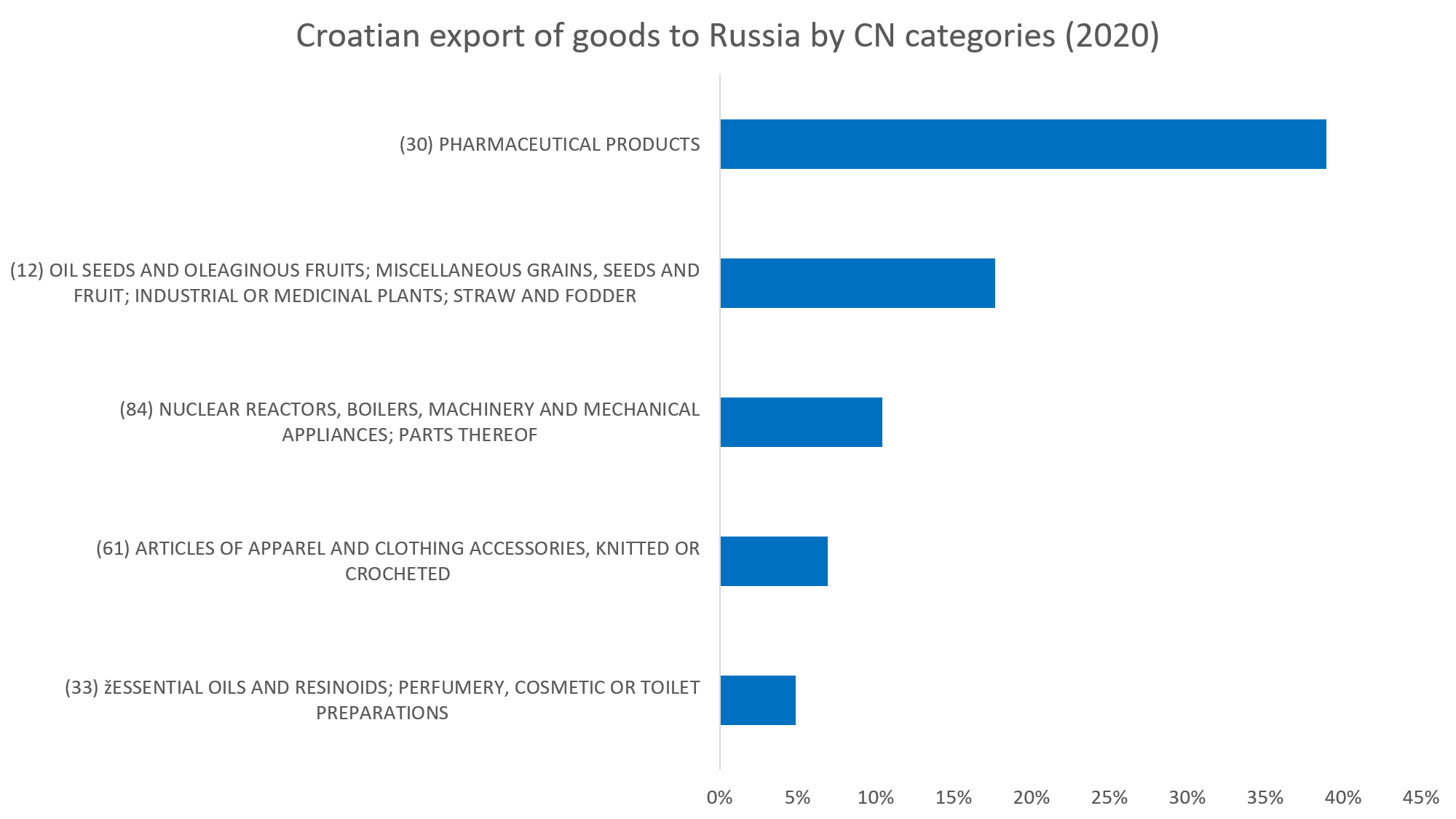
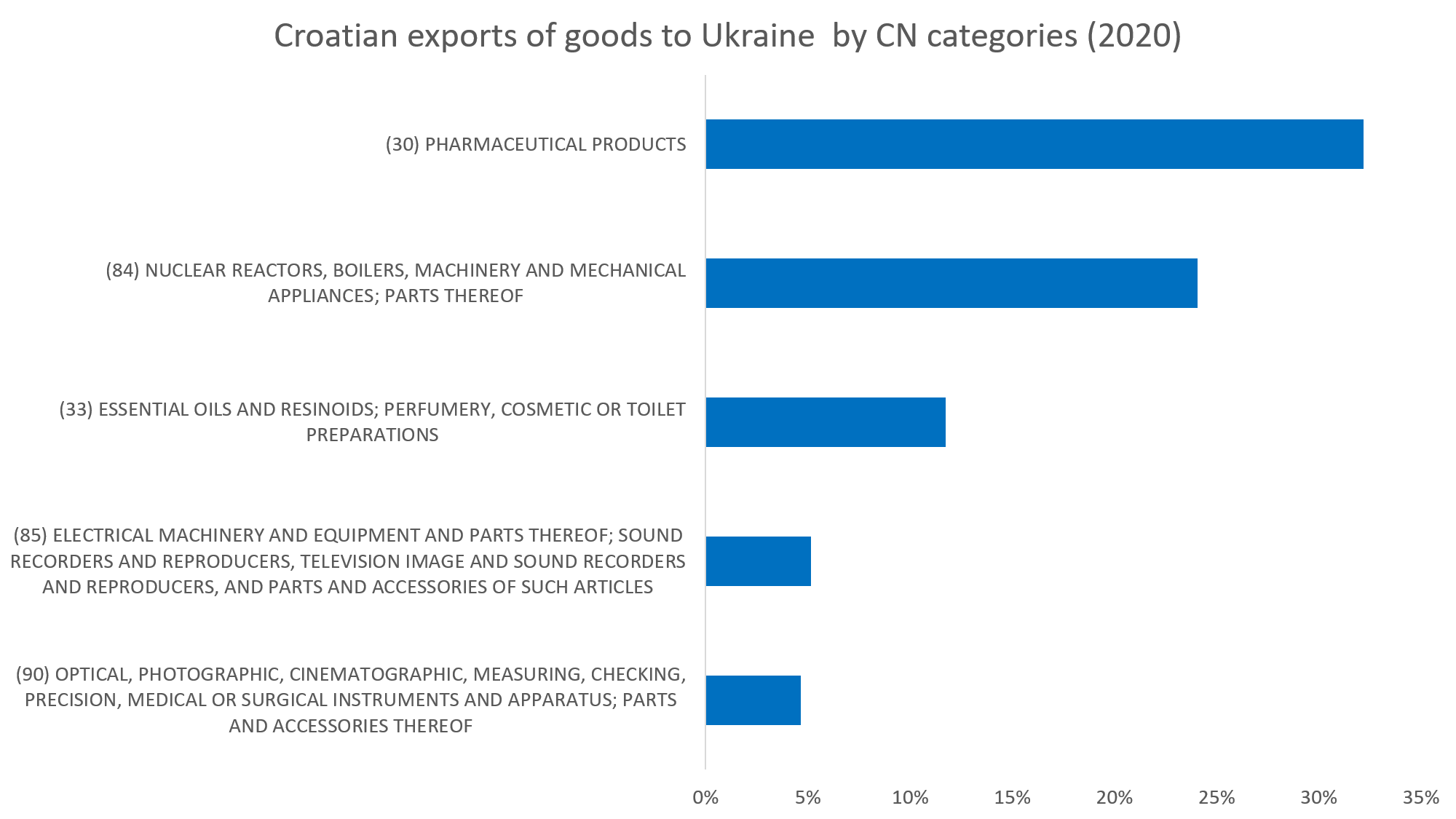
IMPORTS
Croatian imports from Russia have amounted to 463 million Euros worth of goods in 2021, which was a rise of almost 100% compared to 2020. Despite the steep rise imports from Russia are still lower by 38% compared to 2013. The relative share of Russian imports in the total Croatian imports has fallen from 4,5% in 2013 to 1,6% in 2021.
In 2021 Croatia has imported 44 million Euros worth of goods from Ukraine which is a drop of 67% from the peak in 2013. The relative share of Ukrainian imports also fell in 2014 and is around 0.2% since then.
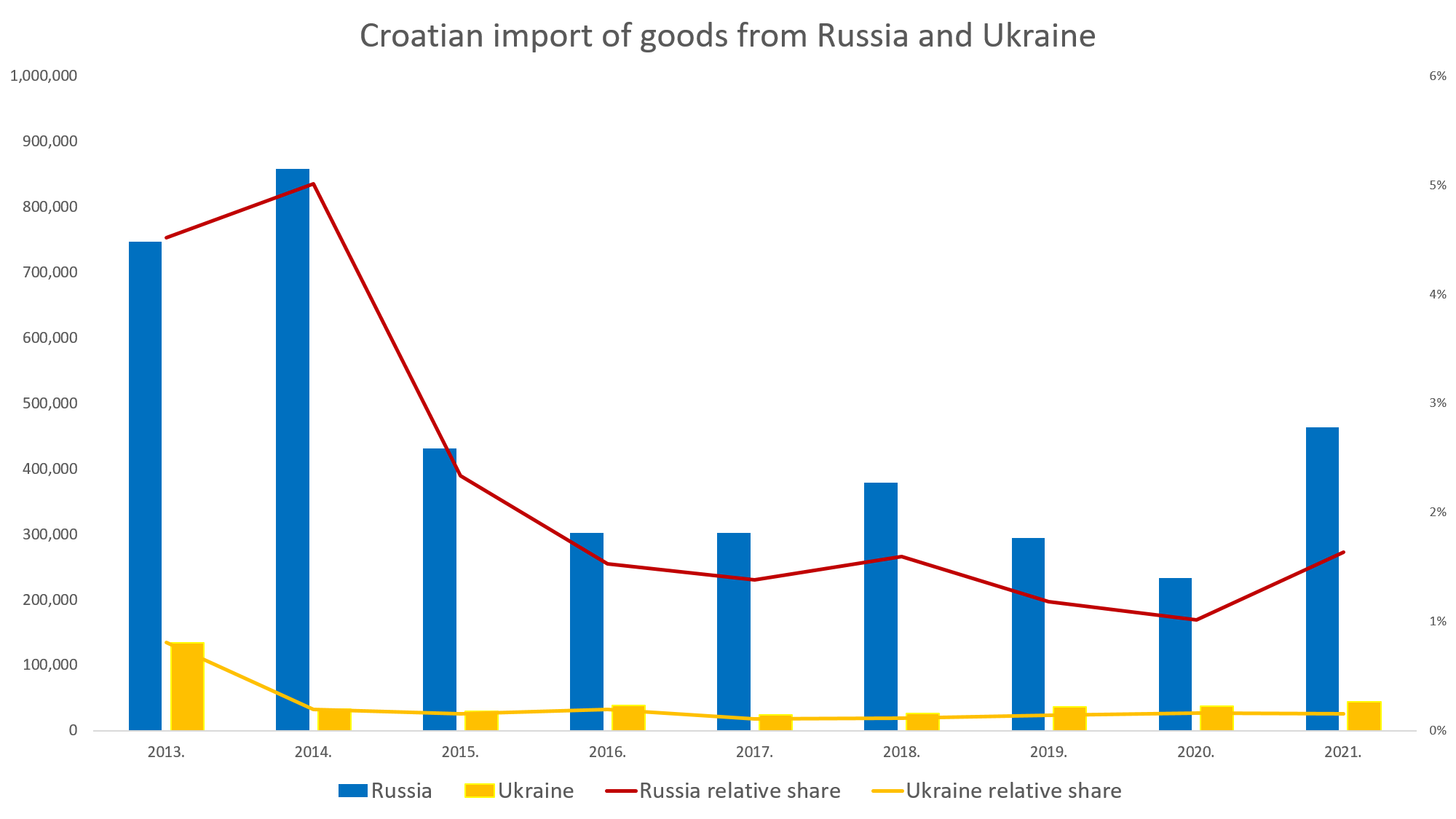
Again, as with the exports, to put it into perspective we can observe the relative share of the Russian and Ukrainian imports compared to other markets. Not surprisingly, EU markets make up the largest share of Croatian imports with 76.5%, followed by CEFTA countries and other countries in Asia with 6.8% and 7.7% respectively. Here we see the same pattern as we did with exports, the Croatian economy is not very reliant on neither Russian nor Ukrainian imports. Moreover, Russia is not even close to Croatia’s biggest importers such as Germany 15%, Italy 13%, Slovenia 11%, Hungary 7%, and Austria 6%.
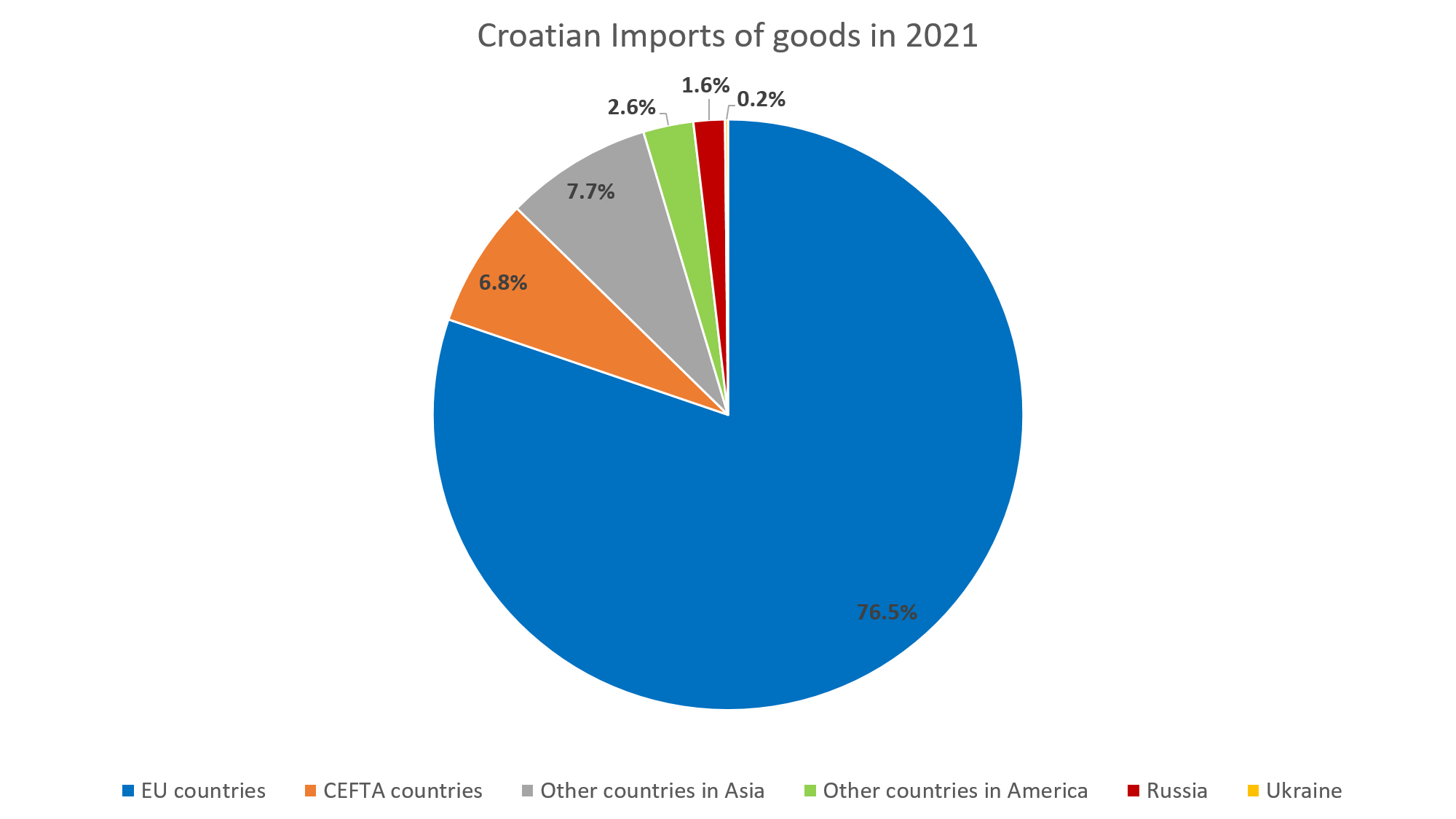
When observing the CN categories, we can see that imports from Russia are dominated by mineral fuels and oils which make up 55.8% of total imports from Russia. However, the relative share of mineral fuels and oils from Russia makes up just 6.6% of total Croatian imports of the same category. Not surprisingly other important categories are metals such as aluminum and copper as well as fertilizers.
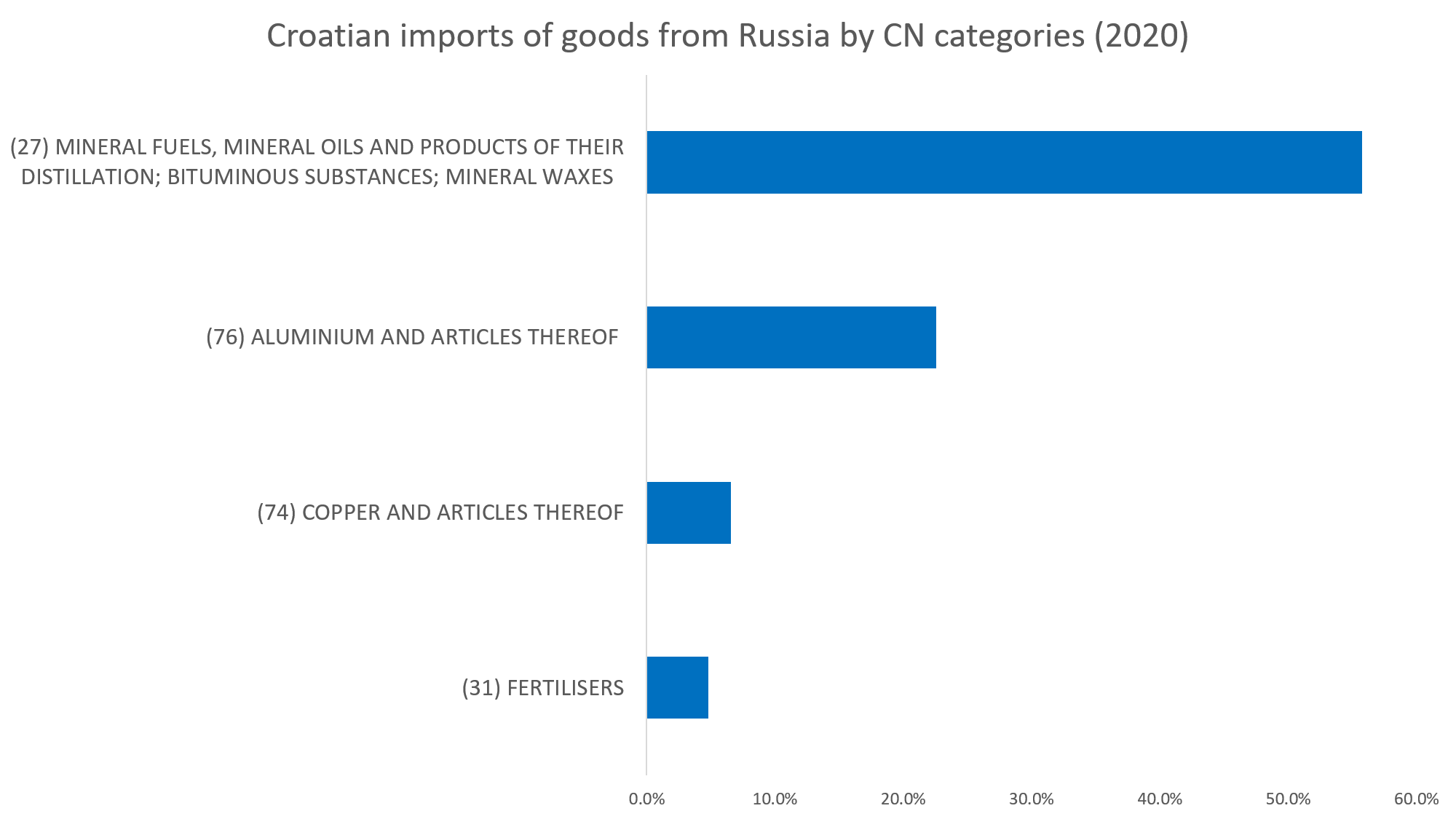
Croatian imports from Ukraine are more evenly distributed and two main categories are (84) and (85) which together account for 1/3 of imports and these are both important export categories to Ukraine as well.
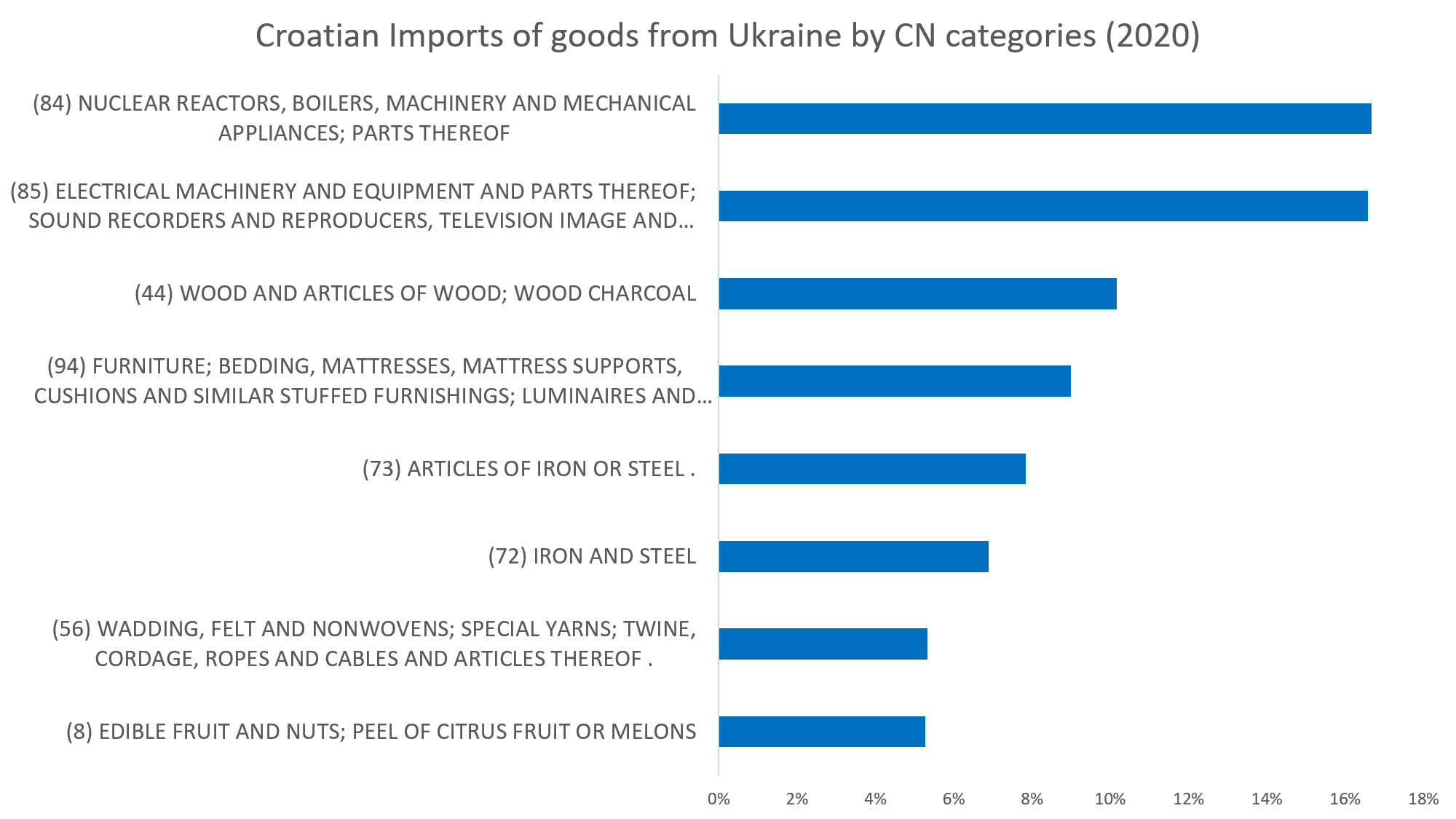
BALANCE OF TRADE
As seen on the graph below, Croatia ended 2021 with a positive trade balance with Ukraine in the amount of 14 million Euros. Since 2017 Croatia has maintained a trade surplus with Ukraine. On the other side, the Croatian trade balance with Russia was negative throughout the whole observed period. In 2021 Croatia had a trade deficit in the amount of 259 million Euros.
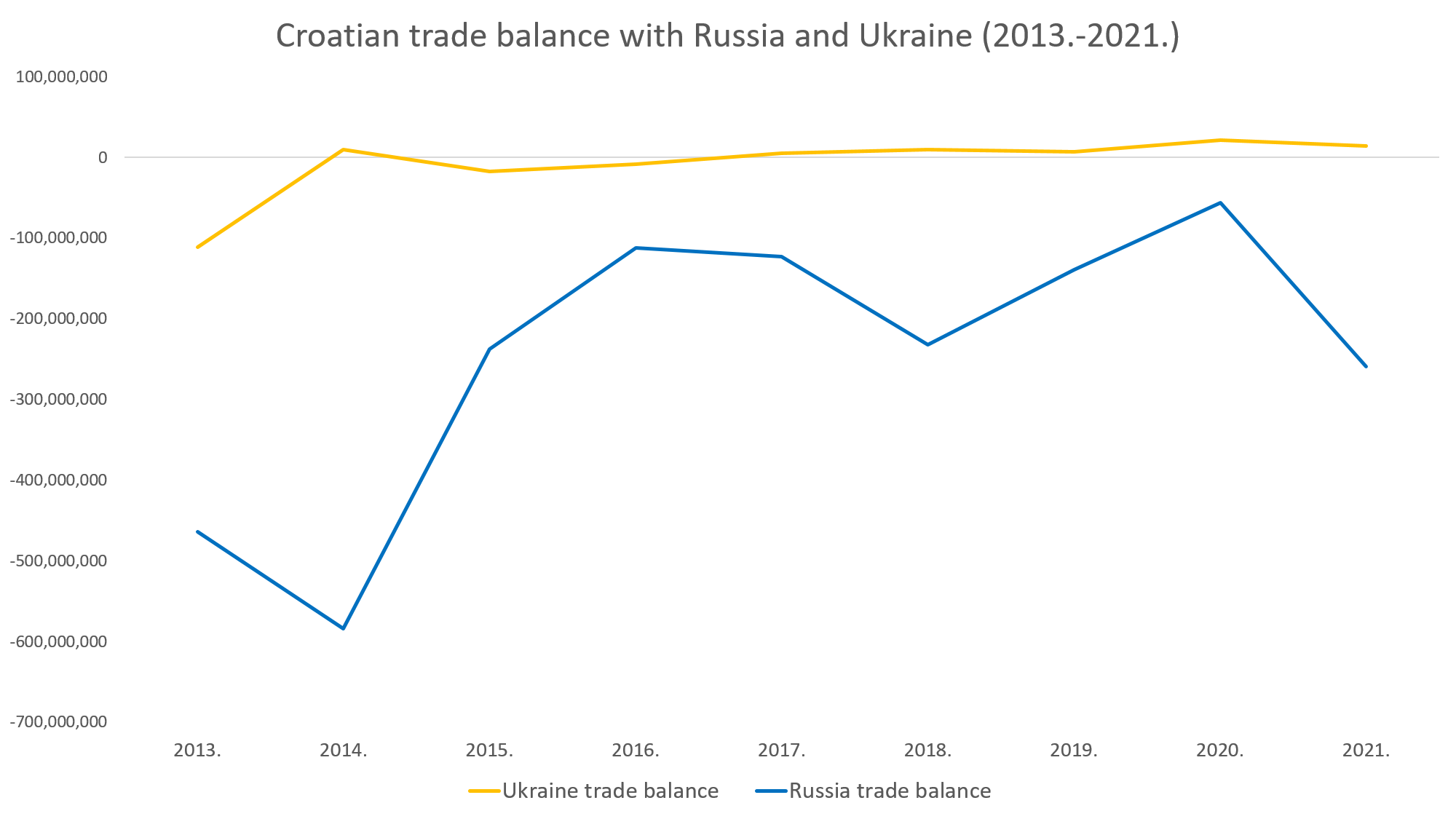
To conclude Croatian foreign trade of goods is not very reliant on the Russian and Ukrainian markets, but the Croatian economy will still suffer the consequences of the imposed sanctions on Russia and from the resulting crisis. Some industries and even more companies are more exposed to these markets and they will hopefully manage this crisis in the best way they can. On the contrary, even though the trade relation with Russia and Ukraine is relatively insignificant, Croatia’s biggest trade partners are mostly European countries which are all impacted to a large extent and the spill-over effect is unfortunately unavoidable.
If you want to find out how the Russian Invasion of Ukraine has impacted the Croatian equity market click here.
All the information provided in this article is taken from the Croatian Bureau of Statistics.
For more, check out our business section.
Božinović: Higher Influx of Refugees From Ukraine Can be Expected
ZAGREB, 20 March 2022 - Since the start of the war in Ukraine, over 8,300 refugees have arrived in Croatia, and Interior Minister Davor Božinović said on Sunday that Europe was braced for the growing pressure on three fronts: energy security, defence costs and accommodation of refugees.
"This is an unprecedented humanitarian issue in Europe. Thousands, tens of thousands of people are leaving Ukraine. We can expect an influx of refugees in all EU member-states, including Croatia", Božinović noted.
"The United Nations' recent projections about up to four million people fleeing Ukraine seems today as a conservative scenario, since the numbers of refugees are already coming close to that figure" the minister told the press after a meeting of the Croatian interdepartmental task force for providing protection for refugees from Ukraine.
"The talks are being conducted at the European level to coordinate the response to many issues stemming from the war in Ukraine", he said adding that one of the issues is how to finance the accommodation of Ukrainian refugees.
Currently, the EU is offering assistance to the countries neighbouring Ukraine that are the first to receive Ukrainians when they leave their homeland.
Croatia is not among those first-stop countries, however, it is one of the countries where Ukrainians seek shelter, and it is ready to take in roughly 20,000 Ukrainians. However, this figure could go up depending on the developments in Ukraine.
Large majority accommodated individually in private homes
"Of those 8,300 refugees, as many as 7,421 are now covered by individual reception initiatives, and 827 are in collective accommodation", said the minister.
The aim is to ensure as many individual accommodation options as possible throughout Croatia.
"The reception centres are operating well, refugees come there upon their arrival and after that they are transferred to properties where they can stay longer", the minister said.
We have published a public call for 10,000 accommodation units throughout Croatia, and all steps we take will be transparent, he said.
Božinović expressed satisfaction with the organisation of the reception of the refugees from Ukraine and explained that the plans were made to be prepared for possible challenges financially, logistics-like and organisationally.
"Croatia wants to provide the best care and sympathy to those people who have experienced the calamities. The help includes not only accommodation and food but also access to education and the labour market as well as to social welfare services", the minister said recalling that the activation of the Temporary Protection Directive.
Economic and Social Council on including refugees in labour market
Božinović said that the possibility of giving refugees access to the labour market would be on the agenda of the Economic and Social Council (GSV) on Monday.
The fast integration of displaced persons is the best way to provide them with a feeling of stability.
Broken down by the age and gender, a mere 12% of the refugees who have arrived in Croatia from Ukraine are men, 48% are women and children account for 40%, Božinović said.
He also informed the press conference that in the scenario that Croatia should care for 20,000 refugees, this would cost HRK 1.3 billion provided that the refugees exercise all the rights they are entitled to.
According to some estimates, the daily healthcare costs for a refugee is HRK 15, and 30 kuna for education.
Remuneration for the properties which their owners have put at the disposal to refugees is also being considered, and the minister cited the experiences of other countries where the rental per day ranges between €5-8 per person, however, the figure is reduced for every next member in the family accommodated.
Croatian-Ukrainian web portal
The interior ministry has also developed a website with the data in both the Croatian and Ukrainian language concerning the refugees, their rights and entitlements and information for prospective volunteers. The website will be updated regularly on a daily basis.
For more on this, check out our dedicated politics section.
Over 8,300 Ukrainian Refugees Have Arrived in Croatia to Date
ZAGREB, 20 March 2022 - To date, over 8,300 Ukrainians fleeing the war have found refugee in Croatia, Interior Minister Davor Božinović said on Sunday.
"Croatia has very well responded to the developments so far. However, watching what is going on, we can see that we will have to be braced for various consequences even for the ordinary citizens, and unfortunately, the worst stage of the war is about to happen", he said after a meeting of the interdepartmental task force for providing protection for refugees from Ukraine.
"This is an unprecedented humanitarian issue in Europe. Thousands, tens of thousands of people are leaving Ukraine. We can expect an influx of refugees in all EU member-states, including Croatia", Božinović noted.
On Sunday, the number of Ukrainians seeking shelter in Croatia exceeded 8,300.
"The numbers are rising, and we also insist on transparency in efforts to provide them with help", the minister said, pointing out to a comprehensive approach to this issue.
We have published a public call for 10,000 accommodation units throughout Croatia, and all steps we take will be transparent, he said.
"Croatia wants to provide the best care and sympathy to those people who have experienced the calamities. The help includes not only accommodation and food but also access to education and the labour market as well as to social welfare services", the minister said recalling that the activation of the Temporary Protection Directive.
Broken down by gender and age, about 40% of the refugees are women and 40% are children, he said adding that all of them will be eligible to receive one-off aid of HRK 2,500 (roughly €333).
For more on this, check out our dedicated politics section.
Guide for Employers: Ukrainians Looking for Work in Croatia Don't Need Work Permit
March 19, 2022 - The Red Cross says that employers call them to offer jobs for Ukrainians. Maria Meleshko, from the Ukrainian community, warns about possible exploitation and violation of human rights. The Croatian Employment Service (HZZ) gives more details, both for Ukrainian citizens and Croatian employers.
Since the arrival of Ukrainian refugees at the Plitvice Motel in Zagreb, where the reception center is located, many employers from Croatia have called and offered them jobs. At the same time, one of the first questions of Ukrainians after arriving at the reception center was whether there was any work for them. ''There are a lot of young people, people want to get a job'', said Nikolina Gotal, spokeswoman for the city society CK Zagreb to 24sata.
Most of them, she adds, are employers from service industries.
''A man from Samobor called and asked for a chef and an assistant chef, a lady from Ukraine told us that she already had a job interview in Pula, so we called colleagues from the Red Cross there to find accommodation for her and her family. In the second week after the arrival of the refugees, two employees of the Croatian Employment Service started coming every day for two hours and talked to the Ukrainians and entered them in their records'', said Gotal.
In addition to employers, the reception center was also contacted by numerous owners of private kindergartens, offering children from Ukraine accommodation in their kindergartens. Finally, she told all employers interested in employing Ukrainians to contact the Croatian Employment Service (HZZ) and coordinate everything through them.
Vlado Karešin, President of the Ukrainian Community of the Republic of Croatia, said to 24sata that they were looking for a job for a Ukrainian who arrived in Slavonski Brod with four children and is a ceramicist by profession.
''Here in Slavonski Brod, except for him, there are all mothers with children, one mother said that she would like to start working as soon as possible, so we are looking for a job for her as well'', Karešin said.
Marija Meleško, from the Ukrainian community in Zagreb, said that she still does not know anyone who got a job and states that it was mostly mothers with children who came from Ukraine and they must first take care of them before they get a job.
''Those who do not have any family or friends here, will want to work immediately. Mothers must first place their child in kindergarten or school and then start working. I only hope and believe that Croatian employers will not abuse people who came to seek salvation in Croatia and that there will be no exploitation of people. People come traumatized, disoriented in time and space, and not ready to control everything because they are in such a psychological state. I hope that their human rights will not be violated for human trafficking so that someone picks them up at the border and ends up who knows where. I hope there will be no such cases. Mothers with children are a particularly vulnerable group and are still coming into the unknown. And of course, I absolutely trust the Croatian police. If that happens by chance, I expect an immediate police response, which I believe will do it all. So far, there are no such situations, they are just fears, but we should be careful'', she concluded.
So, what should be considered before looking for a job in Croatia as a Ukrainian citizen, or before offering a job as a Croatian employer to a Ukrainian citizen? The Croatian Employment Service (HZZ), through a Q&A, cleared up the doubts.
How can Croatian employers hire refugees from Ukraine?
All persons under temporary protection must first regulate their stay in Croatia, they must first go to the Ministry of the Interior, obtain an identity card and OIB. They can then be registered in our unemployment register, and we will refer them to the jobs of potential employers in accordance with their knowledge. The HZZ will work intensively to connect people interested in work and employers.
Should Ukrainians have a work permit?
Temporary protection is approved by the Ministry of the Interior for a period of one year, during which time persons under temporary protection can be employed without a residence and work permit, which must be required for third-country nationals. Since only a small number of refugees from Ukraine have achieved this, it is understandable that they are not yet registered in the unemployment register.
Does HZZ help Ukrainians get a job in Croatia?
Employees of the Croatian Employment Service are daily in reception centers and collective accommodation and in individual interviews record the interest and employment opportunities of individuals and provide basic information about employment and employment opportunities and support they can receive from the job search agency.
How is communication with them?
In order to facilitate communication and provide basic information, the HZZ produced a leaflet in the Ukrainian language and the Cyrillic alphabet. The leaflet can contain all the information on registration in the unemployment register as well as the rights that a person exercises after registration.
Do you expect a large number of Ukrainians to be employed in Croatia?
All persons who express an interest in registering with the HZZ with the counselor will determine with which counselor they can and want to work, which languages and other special skills they use, and the counselor will therefore refer them to the jobs of potential employers. We expect that in the future we will work intensively on connecting people interested in work and employers. Once again, we note that persons must regulate their status in the Ministry of the Interior in order to be able to register in the unemployment register and then be employed.
You can find the list and locations of all HZZ regional offices and their branches HERE.
Source: 24sata.hr
For more on the Ukraine crisis and Croatia, as well as breaking news, follow our news section.
For more, check out our lifestyle section.
340 Ukrainian Refugees Entered Croatia in Last 24 Hours
March 15, 2022 - Hundreds of Ukrainian refugees from the ongoing Russian invasion have been taken care of in the three northern Croatian counties: Varaždin, Međimurje, and Krapina-Zagorje, and more and more are arriving every day. Here are the official numbers in the northern counties.
On Tuesday, the head of the Varaždin Civil Protection Service, Ivica Matošić, confirmed that 16 people from Ukraine are currently accommodated in the reception center in the Varaždin Arena, while 37 of them are in collective accommodation at the Turist Hotel, reports Index.hr. According to him, there are currently 106 Ukrainian refugees in Varaždin County.
He emphasized that they are doing everything in the county to provide the necessary accommodation capacities for the reception of a larger number of refugees.
In Varaždin County, private accommodation with 1200 beds
"At the moment we are talking to the owners of private accommodation and those with whom we reach an agreement will sign an agreement on the use of their accommodation facilities for so-called collective accommodation. We think we have enough capacity and will be able to respond to all needs," said Matošić, who added that private accommodations have about 1,200 beds.
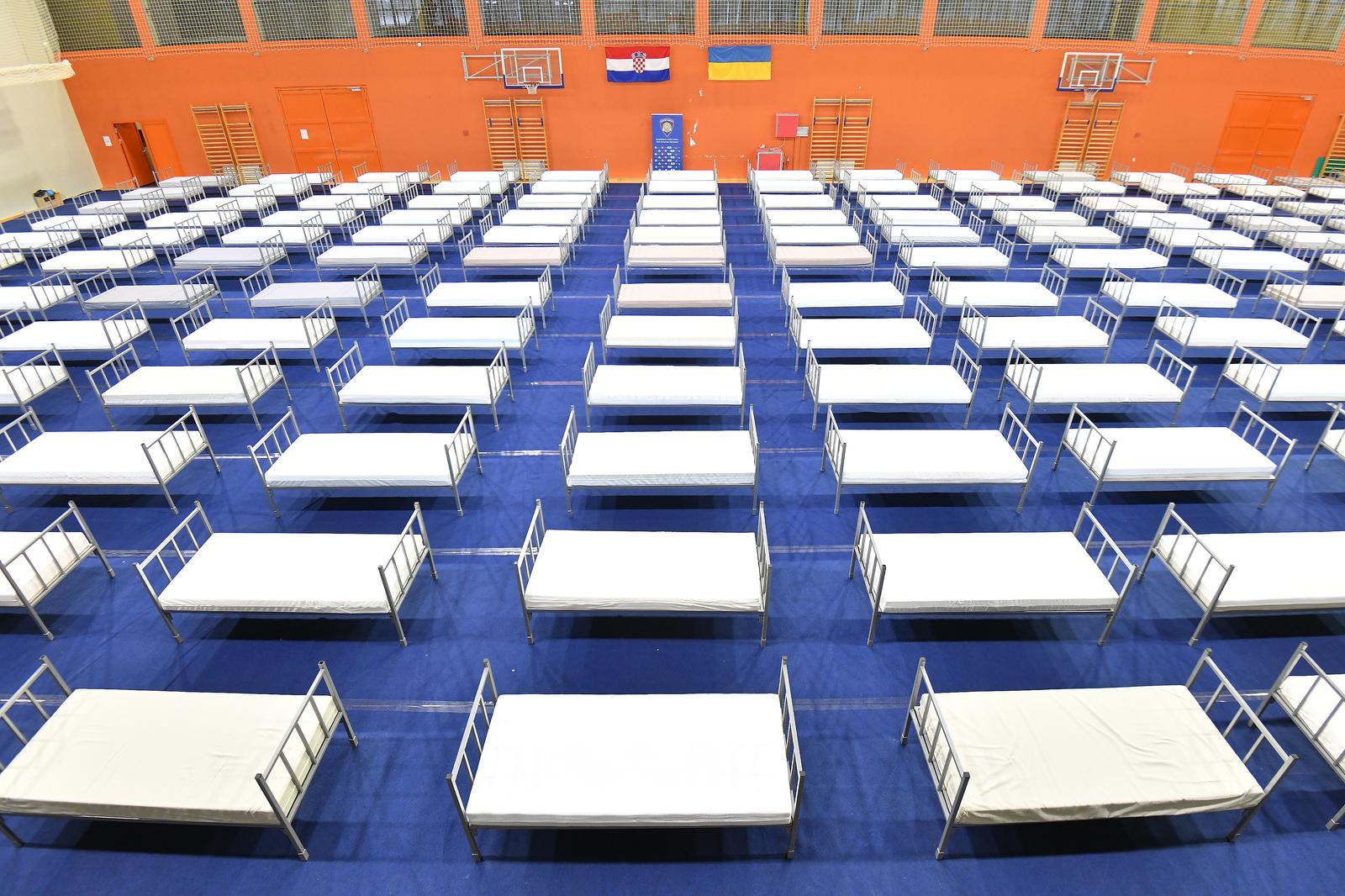
The small hall of the Varaždin Arena is ready to receive Ukrainian refugees. (Photo: Vjeran Zganec Rogulja / PIXSELL)
Twelve refugees who arrived in Lovrečan in Varaždin County last night are housed in the Druškovec parish court in the Maruševec municipality.
This was stated by the pastor of the parish of St. Juraj Maruševec, Krunoslav Milovec. According to him, it is mostly women and children and one elderly person, emphasizing that refugees are "traumatized by everything."
"With them came two animals that we allowed to be temporarily housed in the parish court until we find a way to adequately care for them," he said.
The parish court currently has the capacity to receive three more people from war-torn Ukraine, and as Milovec pointed out, the locals and everyone else are ready to help them.
"Refugees can stay with us as long as they want. At the moment, they have everything they need, and we will get them anything missing," the pastor said.
In the last 24 hours, 340 Ukrainian refugees entered Croatia
According to the latest information, in the past 24 hours, 340 Ukrainian refugees entered Croatia through the Goričan border crossing, confirmed the Chief of the Civil Protection Headquarters of Međimurje County, Josip Grivec.
85 of them are continuing their journey to other countries, and 15 of them have stated that they will stay in the area of Međimurje County, said Grivec and explained that, as a rule, women with children arrive and are mostly accommodated in private accommodation.
"Međimurje serves as a passing point for refreshments, charging mobile phones and the like, in which the county, municipalities, and citizens help. The first shipment of the Directorate with 'lunch packages'' has arrived. They are adequately taken care of and they do not lack anything, so everything that is needed is still being collected," said Grivec.
There are currently 27 Ukrainian refugees in Krapina-Zagorje County, said Stjepan Skuliber, head of the county's Civil Protection Headquarters. Given that a reception center has not yet been registered in the county, he said, people from war-torn Ukraine are in private accommodations.
"We have sent a proposal to the Directorate of Civil Protection to form a reception center in the sports hall of the High School in Krapina, although we believe that due to the proximity of reception centers organized in Rakitje and Hotel Plitvice we may not need another in our county," said Skuliber.
For more on the Ukraine crisis and Croatia, as well as breaking news, follow our news section.
Intellias: Ukrainian IT Company in Zagreb Begins Hiring Process in Balkans
March the 15th, 2022 - We recently wrote about the Ukrainian company Intellias choosing to move their planned Novi Sad development centre to Zagreb, citing pro-Russian views of the Serbian Government that they could naturally never support. They're now going to be employing people from across the Balkans from right here in Zagreb.
As Poslovni Dnevnik/Lucija Spiljak writes, one of the largest Ukrainian IT companies, Intellias, recently announced that it was giving up on opening a development centre in Novi Sad, Serbia this spring, and moving it instead to Zagreb.
Although the company's decision to relocate is fresh, they have already registered a company here in Zagreb and are currently looking for an office that, according to the company, will meet all the company's criteria and principles of "smart comfort".
Now they're here in Zagreb, they are looking not only for an office, but also for Croatian experts in the so-called Balkan IT hub, where they'll bring their international clients and handle large projects.
Quality solutions
"We're creating a southern European IT hub in which engineers from all over the region will be able to work. We expect that the centre of this IT hub will be in the new office in Zagreb. Croatia is home to a strong IT community and a very well-developed infrastructure where more than 60,000 IT professionals work. We firmly believe that together we will be able to provide our customers with quality technological solutions and services. We plan to hire Croatian experts and talent from across the entire region who are eager to work with us.
Despite the relocation of the office to Zagreb, we may work with some contractors in Serbia, from project to project, because we understand that they also have talented engineers,'' they explained from Intellias.
They evacuated their employees from dangerous parts of Ukraine, which has been under Russian invasion for more than two weeks now. They have already restored 97 percent of their service delivery capacities, and point out that their clients have shown understanding and support during this tumultuous period.
Croatian support
Intelligence leader Vitaly Sedler said in a post on social media that they chose Croatia "because of its consistent pro-Ukrainian position, support for Ukraine's EU bid, and its closing of its skies to all Russian air traffic,'' but also because of the support of Croatian political leadership for displaced Ukrainians fleeing their country. Not to mention the ready and willing Croatian volunteers who have already travelled to Ukraine to help the Ukrainian army in their defence of their homeland against Russian aggression.
Intellias is otherwise one of the largest Ukrainian IT companies with more than 2,500 professionals, which has already received numerous international awards for its work and for being the best IT employer.
Their company development centres are located in Ukraine, Poland, and now right here in Croatia. They also have offices in Germany, Israel, the United States, Saudi Arabia and the United Arab Emirates. Intellias develops complex software solutions and provides professional services, specialises in the automotive industry, navigation systems, finance and telecommunications technologies, and their products are used by more than two billion people worldwide.
For more, check out our business section.


